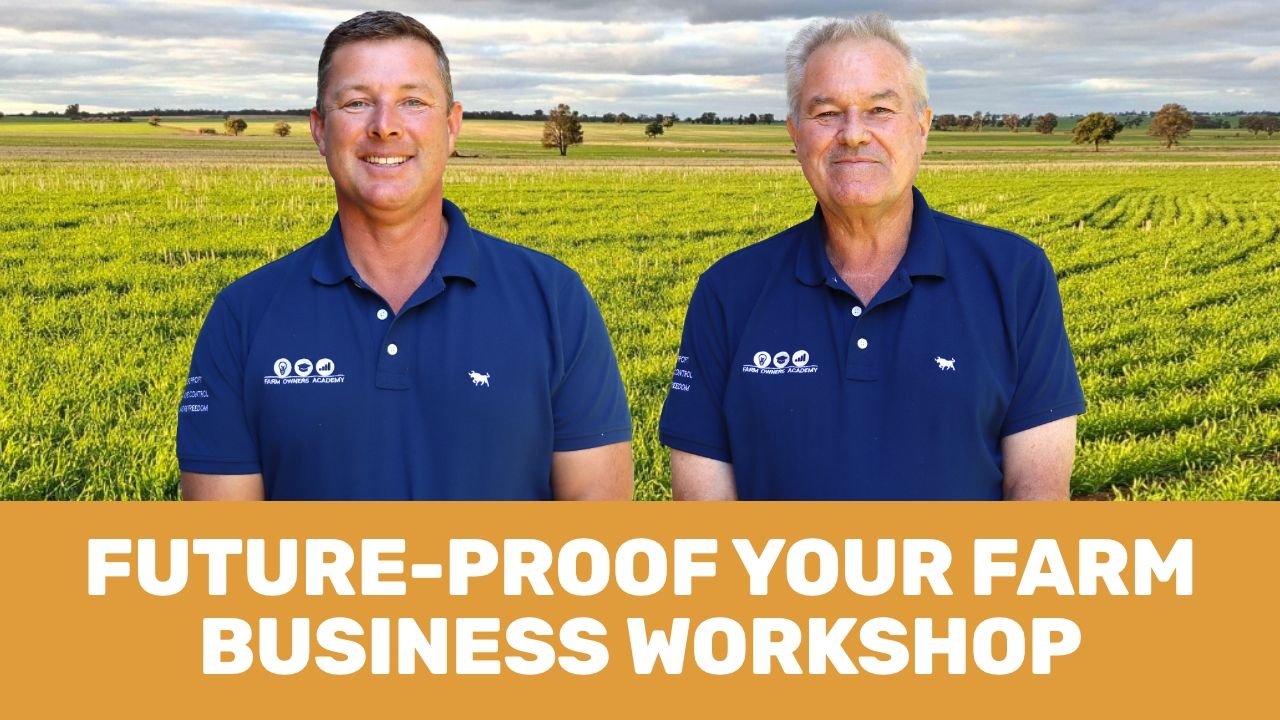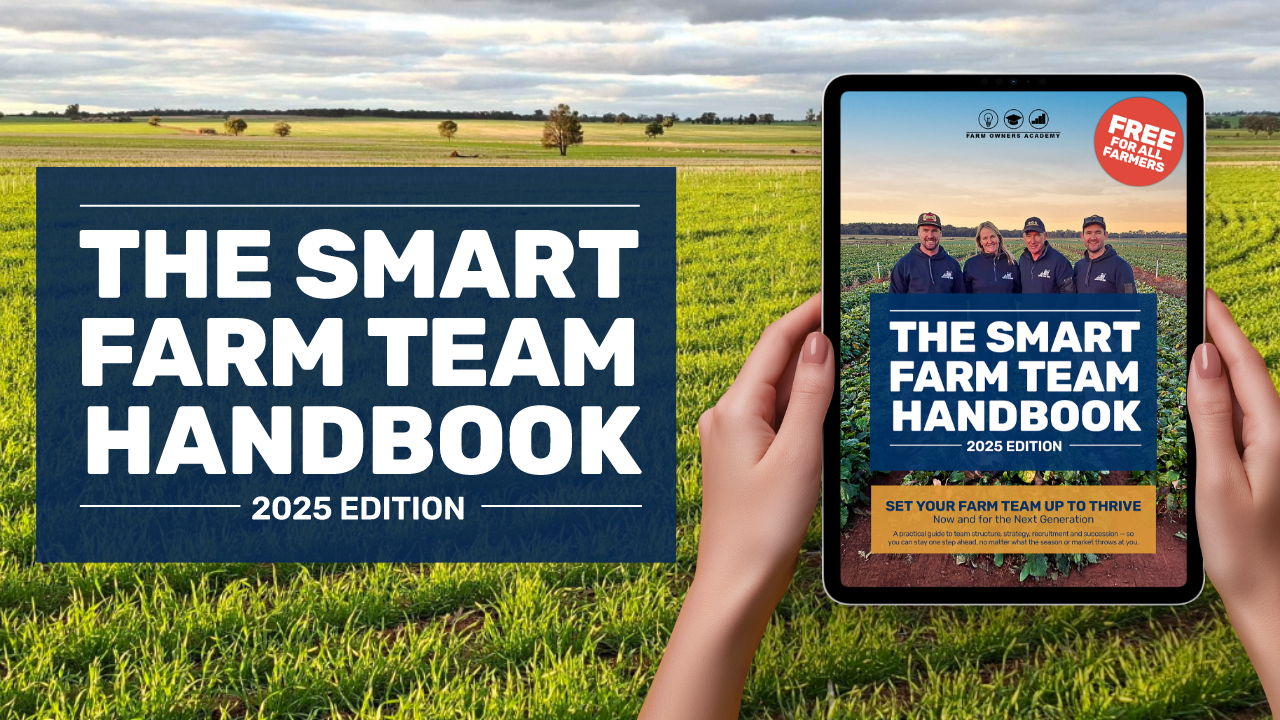Creating Value in Business
Mar 03, 2023
I truly believe that a good business model trumps hard work. From my own experience with my on-farm and off-farm businesses, and through the experiences of others I have worked with, I know that a good strategy and business model are the tools that really set us free in business. Business is an intellectual sport, and we have to be willing to upskill ourselves in business so that our farm is working for us as the vehicle to achieving what we want in life, rather than the other way around.
As farmers, we may feel that our business is different from that of a restaurant, accounting firm or physiotherapy practice and that a strong business model is not relevant for us. However, most of us in agriculture are not thinking critically or strategically enough, and this is having a significant negative impact on our farming business, lifestyle, family and freedom. We must be open to different ways of doing things, different methods of expanding and different off-farm opportunities if we are to increase our wealth and expand our farm. Here I discuss how we can achieve freedom by creating greater value in our farming business, and the importance of thinking a bit differently in order to achieve this.
The importance of a solid business model (and you may not get it right the first time)
In a recent The Profitable Farmer Podcast episode I spoke to Our Cow founders Dave and Bianca, who within three years had gone from struggling small-farm owners to running a highly successful meat subscription business, working with farmers in NSW and QLD and delivering meat across three states. They knew that their farm, struggling already and then hit with drought, bushfires and floods, couldn’t support them, or the lifestyle they wanted.
However, with some lateral thinking and a clever business model, they have created wealth and achieved their definition of what it means to be ‘’freedom farmers’ – that is, their off-farm business is creating an income that supports themselves and their family. That’s not to say they didn’t have failures; Dave and Bianca had a few failed attempts at getting their business model right. However, they finally found their perfect niche through paddock-to-plate meat subscription and have guaranteed themselves a predictable and repeatable income every month. This is a great example of the importance of a solid business model for income stability and wealth creation.
The best thing you can do for your business
I believe that the best thing you can do for your business is to get it to a point where it can run with high performance, structure and stability, but without you. To have your business consistently turn a good profit while under management means that you have a long-term asset you would never want or need to sell, and allows you to step away and live the lifestyle you want.
Now this process can take between three to five years to achieve, but if you’re willing to put in the work that’s required over that time, including having strong systems in place and a good reliable team, then your business can become an asset that allows you to have time away with your family – whilst still delivering a profit to you all year round.
The business model to avoid if you want to create value
Contrary to this, many farming families across Australia are a little like a man in a van; you have a business that is reliant on you. I don’t believe there is much value in this kind of business model because the business doesn’t work if you are not physically present. This will create problems for your lifestyle, family, mental health and financial freedom.
Great business owners understand that business is a form of leverage, and that you should be aiming, in agriculture as in any industry, to have a business that works for you, rather than you working for the business. Many of us in farming have grown up in a culture that celebrates and respects the farmer who works the hardest, longest hours outside with his team. However, what you should be doing is looking at the hours you are working and critically evaluating whether you are really using your time in the best possible way to add value to your business.
How well could your business run without you – and how do you get there?
Many farmers believe their money is made in the paddock, but this simply isn’t the case. Money is made when you are doing the critical thinking around your business model and using this to achieve leverage. Establishing a reliable team that is underpinned by strong structures and systems will enable you to step back and have time away from the farm with your family, or pursue other interests; whatever your priorities and lifestyle goals may be.
The only thing stopping you from achieving this at a significant level is your own mind and skills. This is why it is so important to educate yourself and upskill your business knowledge; everything is possible if you are willing to learn and think a little differently. Consider, honestly, how strong your business is and how well it could currently cope under management. If you apply this rigour to your farm, a self-sustaining, profitable business that runs without you is achievable.
Making it work regardless of your ‘type’ of farming business
From my experience, I can identify three different types of farming businesses in Australia.
The first is the large, established family farm that is probably four or five generations old, has enough scale to justify expanding, and provides enough profit on its own to support multiple households, reduce debt, educate kids and create wealth.
The second type of farm is similar to Dave and Bianca’s at Our Cow; a small first or second generation farm that often needs a second off-farm income to reduce debt, educate kids and support the family. The idea of expanding by buying additional land in the current climate is disarming, but the farm needs to expand to create increased income.
Finally, the third type of farm may be a third or fourth generation contracting business such as harvesting, spraying or lamb marking that requires an additional full-time off-farm wage to support it. If you can identify your farm as type two or three, then diversifying your income with a complementary off-farm business is the best way to stabilise your income, create wealth and expand your farm.
How to take the next step towards off-farm income
Having off-farm revenue that supports and complements your family farm can provide you with financial and farming freedom. Learning skills to apply to an off-farm business that isn’t traditional shares or real estate, such as a small business outside of agriculture, can really take the financial pressure off your farm whilst providing you with an income that you can put back into it. Investing in a small business that is already under management is ideal, because farms tend to be asset rich but cash poor, whilst small businesses are cash rich but asset poor.
Many farming families are currently taking a significant risk by placing their entire financial dependence on their farm, and expecting the farm to achieve everything they need and want for themselves, their families and their lifestyles. Therefore, diversifying your income by investing in a business that complements your farm, just like Dave and Bianca did with Our Cow, reduces this pressure whilst enabling you to expand by directing profits from your off-farm business back into the farm.
To conclude, I believe that we often ask too much of our farms and this leads us into financial stress, instability and pressure. By diversifying our income with a complementary and well-designed off-farm business we are able to create wealth, reduce debt and expand. The only way to achieve this is by prioritising our time and learning the business skills needed to think and act like a CEO.
As farmers we often get stuck doing low value tasks or choosing farmwork over CEO-level activity. If we want to scale our farm and off-farm business then we have to focus our time on high value priorities, and give ourselves permission to set aside a full day each week to do this crucial work. By setting aside this time to focus on building out systems, strategy and structures, your farming business and off-farm business will, in time, flourish without you.
This allows you to have time away with your family, pursue your other hobbies and interests, and have a greater quality of life. If business is an intellectual sport, then a good business model is the tool that will allow you to succeed; financially, mentally and emotionally.
It is not our farm, lifestyle or machinery that are our greatest assets as farmers; it is our time, and how we are able to use it.
If you would like to discuss your own farming operation and how you could look to diversify your income or improve your business skills, or to simply have a chat, please get in touch with us on 0447 184 167, or email support@farmownersacademy.com at any time.
By Jeremy “Hutch” Hutchings, Managing Director of Farm Owners Academy. You can listen to Hutch discuss creating value in business on Episode 87 of The Profitable Farmer podcast.









